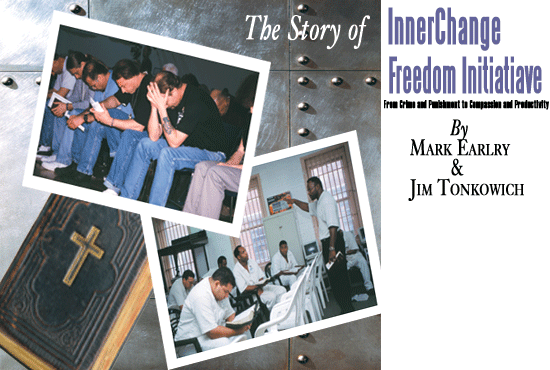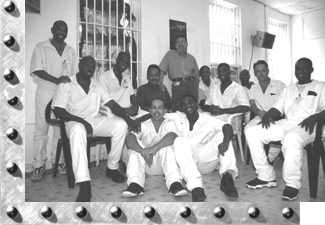The Story of Inner Change Freedom Initiative
Mark Earley September/October 2003
Getting your Trinity Audio player ready...


Prison was not a new experience for Michael Potts. This was his third time behind bars. Like the overwhelming majority of prisoners, Michael was caught in a revolving door. Prison did nothing to prepare him for life on the outside, and so, given the opportunity, he kept falling back into criminal activity. But Michael decided that this time it was going to be different.
Many prisoners looking toward release from yet another prison term think the same thing. But for most, the pattern is not broken. Margaret Talbot writes in The Atlantic Monthly that many released prisoners "will be obdurate 'churners,' who have already been re-incarcerated for a new crime or a parole violation and are now being let out again." Her article, appropriately called "Catch and Release," notes that a prison experience makes many "more violent or antisocial than they were before," that "only about 13 percent will have participated in any kind of pre- release program to prepare them for life on the outside," and that "nearly a quarter of them will be sent home unconditionally and with no supervision."
Is it any wonder that recidivism in this country is between 60 and 70 percent? And with approximately 630,000 prisoners being released this year, recidivism is every American's problem.
Michael Potts's third term in prison was his last. As a prisoner at the Carol S. Vance Unit in Richmond, Texas, Michael was able to voluntarily join InnerChange Freedom Initiative (IFI), Prison Fellowship's values-based prisoner rehabilitation program.
InnerChange Freedom Initiative is based on a pioneer program founded in 1973 in Brazil. Dr. Mario Ottoboni, a community leader and strong Roman Catholic Christian, responded to what he believed was a call from God and made a commitment to serve and minister to inmates at the nearby prison, Humaita. Conditions in the prison were appalling, brutal, and squalid. But Dr. Ottoboni and his growing team of volunteers persisted.
Humaita is now run as a faith-based prison. Instead of the usual sullenness there are smiles on the faces of men—men at peace with themselves, with others, and with God. The prison is orderly, clean, and safe. It is the kind of place where a convicted murderer can be trusted. In February 2002 the Texas Journal of Corrections published the results of an intensive three-year study of Humaita. The study found that the Brazilian faith-based prison's recidivism rate is only 16 percent—compared with Brazil's national average recidivism of 50 to 70 percent.
InnerChange Freedom Initiative is an attempt to reproduce the same kind of results in the United States. We are experiencing real and measurable success with male prisoners in Texas, Kansas, Minnesota, and Iowa.
InnerChange Freedom Initiative is based on a set of values that are the polar opposite of the values that predominate among prisoners and in the culture that breeds them. We believe that if a prisoner is going to get out of prison and contribute to society, he needs to adopt a whole new way of looking at the world and at others. That is, we believe he will need to be transformed from the inside. Without God in the picture, a prisoner is much more likely to slip back into old ways. With God, all things are possible.
The core values of InnerChange Freedom Initiative are Integrity/Truth, Fellowship, Affirmation, Responsibility/Restoration, and Productivity.
Integrity/Truth.
It should come as no surprise that honesty is not a value common among criminals. InnerChange Freedom Initiative participants are taught the value of truth and truth telling. Prisoners are encouraged to see how personal integrity will promote their success whether in prison or out. The core value of truth is also an assertion that there is absolute truth that can be known through natural law and biblical revelation.
Fellowship.
Fellowship is the value that builds community in the program. The unity prisoners feel in the program is based on their shared commitment to submit their lives to God. Prisoners are taught that just as God loves them unconditionally, they need to reflect the same kind of love to those around them. Tohelp in this, each participant has a mentor who stays with him through the transition from prison to life on the outside. Fellowship continues when prisoners leave and choose to join local churches where they can continue to be affirmed and held accountable.
Affirmation.
This is a value both in InnerChange Freedom Initiative and in more therapeutic models of prisoner rehabilitation. Many inmates have never experienced affirmation and do not know what it means to be valued. Others have been affirmed in wrong attitudes, false values, and criminal behavior. In IFI we believe affirmation flows from trust in a loving God and is an affirmation for good.Responsibility/Restoration.
InnerChange Freedom Initiative places a heavy emphasis on taking responsibility for choices. Participants take responsibility for their actions by initiating acts of healing and reconciliation with those they have victimized, alienated, and hurt. For example, participants are encouraged to write to their victims, admitting their crimes and asking forgiveness. This sets not only the prisoner but often the victim free, and we have seen remarkable friendships develop between prisoners and their victims. In this way prisoners are restored to their Creator, their families, and their communities.
Productivity.
The Bible has a high view of productivity and work; most inmates have a very low view of productivity and work. InnerChange Freedom Initiative defines productivity as the wise use of time in accordance with God's principles for life. Participants learn to set goals and priorities and to balance work, worship,and rest. IFI teaches job skills, but we know that those skills will come to nothing without the value of productivity driving behavior.
From the very beginning InnerChange Freedom Initiative has been voluntary. The only states that have InnerChange Freedom Initiative programs are states that have invited it into their prisons.
Similarly, all participation in InnerChange Freedom Initiative is voluntary. Prisoners apply for the program and are fully briefed on the values-based, Christian character of the program. They also know that Christian faith, or faith of any kind, is not a prerequisite for participation or graduation.
We make it clear that InnerChange Freedom Initiative is not a path to an easier life in prison. On the contrary, IFI places more structure and more demands on the prisoners. During a typical day at InnerChange Freedom Initiative, prisoners wake up at 5:00 a.m. and eat breakfast at 5:30. Morning devotions begin at 6:00 a.m., followed by school, work, or daily living skills classes and leadership training. Life skills include literacy, how to find a job, and financial management. These classes run from 7:00 in the morning to 3:00 in the afternoon. After dinner there are more classes, a study period, and lights out. Every day is full and highly structured. And InnerChange Freedom Initiative prisoners do not watch television. Overall, it is far easier to stay in the general prison population and avoid the extra programs, responsibilities, and discipline that are central to InnerChange Freedom Initiative. Participants work hard for what they achieve.
The InnerChange Freedom Initiative programs that operate in Texas, Kansas, Minnesota, and Iowa in no way violate the establishment clause of the First Amendment to the Constitution. In fact, the Federal Welfare Reform Law of 1996, signed by President Bill Clinton, allows a state to include religious organizations as social service providers. Congress enacted and President Clinton signed a Charitable Choice provision to encourage states to include overtly religious organizations in the delivery of publicly funded social services. The law protects the religious nature and character of service providers and the religious freedom of participants and nonparticipants. And federal civil rights statutes permit faith-based service providers such as InnerChange Freedom Initiative to hire only staff whose personal beliefs correspond with those of the organization.
Such state-funded religious programming is nothing new in the United States. Most prisons have chaplains from a variety of faith traditions who are employees of the state. In the case of InnerChange Freedom Initiative, no state funds are going to religious programming. IFI uses state monies solely for secular expenses. Prisoners are housed, fed, and taught job and life skills with state funds. The expense of the religious programming is paid for by private donations. InnerChange Freedom Initiative
staff members are Prison Fellowship employees, not state employees, and the program relies heavily on volunteers who come from a wide variety of Christian denominations including mainline Presbyterians, Catholics, Southern Baptists, Episcopalians, and United Methodists.
Since its inception in 1997 InnerChange Freedom Initiative has served bank robbers, embezzlers, members of drug cartels, and murderers. Many, such as Michael Potts, were repeat offenders caught in a cycle of recidivism. And InnerChange Freedom Initiative has been effective in breaking that cycle in the lives of men like Michael and men like Victor Sanchez, a former "kingpin drug seller." After Michael completed his prison term and IFI, he started a successful remodeling business. Then he went back to prison as an IFI volunteer. He has been mentoring Victor, who recently left prison and now works for Michael. "IFI really prepared me through training to work on the outside," says Michael. "They put me on the path I needed to be on when I got out." That, in a nutshell, is what InnerChange Freedom Initiative is all about.
The correctional system in America is broken. We have 2 million people in prison, 630,000 getting out this year. Of those getting out, 60 to 70 percent will be back within two years. If new offenders are entering at a constant rate at the same time, we had better build prisons at a record rate or find a solution to recidivism that works. InnerChange Freedom Initiative has that solution—a faith-based solution.
InnerChange Freedom Initiative has proven to dramatically reduce reincarceration rates among inmates. In February 2003 the Criminal Justice Policy Council in Texas released an evaluation of the Texas program with minimum-security prisoners. The report found that of the inmates who completed the Texas InnerChange Freedom Initiative program, only 8 percent returned to prison within two years, compared with a 22 percent return rate for a comparable group of inmates who were eligible for the program but did not participate and a 42 percent return rate for Texas prisons overall. This is revolutionary progress, and it is good news for America.
What we need in our correctional system is an opportunity for hearts to be transformed, not simply for people to get some job skills. What Prison Fellowship provides in InnerChange Freedom Initiative is not only skills, but hearts that have been transformed through the love of God and the power of the gospel of Jesus Christ. And this is of great benefit to prisoners, their families, their victims, their communities, and, ultimately, our whole society.
